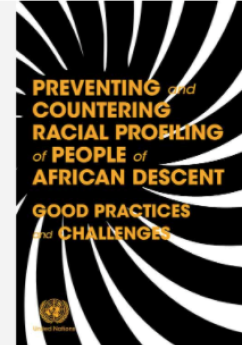Preventing and countering racial profiling of people of African descent (2019)
Published
30 January 2019
Focus
People of African descent
Good practices and challenges
This publication contains the findings of the Secretary General’s 2018 report A/73/354 submitted pursuant to General Assembly resolution 69/16 in which the Assembly requested the Secretary-General to submit a progress report on the implementation of the activities of the International Decade of People of African Descent.
It provides an overview of:
- Types of racial profiling experienced by people of African descent;
- Applicable international legal framework;
- Actions taken by international human rights mechanisms;
- Documented examples of good practices for addressing racial profiling.
Summary
This publication is organized as follows:
- Foreword by UN Human Rights Commissioner Michelle Bachelet
- Introduction
- Background
- Definition of racial profiling
- Examples of racial profiling of people of African descent
- International human rights law, legal and policy framework and the work of human rights mechanisms
- Impacts of racial profiling
- Good practices
- Overview
- Prohibitions against racial profiling and guidance for non-discriminatory law enforcement
- Awareness-raising, training and recruitment
- Community engagement
- Data collection
- Internal accountability
- External accountability
- Conclusions and recommendations
Foreword by Michelle Bachelet, UN High Commissioner for Human Rights
What is racial profiling?
Racial profiling refers to the process by which law enforcement relies on generalizations based on race, colour, descent or national or ethnic origin, rather than objective evidence or individual behaviour, to subject people to stops, detailed searches, identity checks and investigations, or for deciding that an individual was engaged in criminal activity. Racial profiling results in discriminatory decision-making. There are examples of law enforcement agencies’ targeting people of African descent across a range of national contexts.
Whether arising from the attitudes and practices of individual officers or the discriminatory culture or policies of law enforcement agencies, racial profiling is a long-standing practice in many agencies. Moreover, contemporary concerns about terrorism and migration continue to add pressure on law enforcement officers, which frequently drives them to resort to the misguided strategy of racial profiling in pursuit of public safety and security.
Racial profiling violates a number of key principles and rights
The practice of racial profiling violates a number of key principles and rights under international human rights law. These include non-discrimination and equality before the law and equal protection of the law. By its nature, racial profiling departs from a basic principle of the rule of law that law enforcement determinations should be based on an individual’s conduct, not on their membership in an ethnic, racial or national group. Racial profiling may also have a negative impact on peoples’ enjoyment of other human rights, including the rights to life, liberty and security, privacy, freedom of movement, protection against arbitrary arrest and other interventions, effective remedy, protection of the best interests of the child.
Racial profiling has been found to be an ineffective policing tool, as it is largely unsuccessful in crime prevention. It has alienated communities singled out for intensified attention and undermined confidence in law enforcement, exacerbating tensions between police and targeted communities. Many human rights mechanisms have expressed grave concerns about racial profiling of people of African descent. The programme of activities for the implementation of the International Decade for People of African Descent includes a call for States to design, implement and enforce measures to eliminate this problem.
Examples of good practices for addressing racial profiling
The present publication provides an overview of the types of racial profiling experienced by people of African descent, the applicable international legal framework, actions taken by international human rights mechanisms and documented examples of good practices for addressing racial profiling, which focus on prohibition of the practice, positive guidance for law enforcement agents, training and recruitment, community engagement, data collection, and internal and external accountability. National and local governments from around the globe can draw on these ideas in developing their own plans to address racial profiling, promote equality and protect the rights of people of African descent. This is not just the right thing to do, it is the smart thing to do to protect public safety and security.
Related report
The Committee for the Elimination of Racial Discrimination (CERD) has issued draft General Recommendation N° 36 (May 2019) on preventing and combating racial profiling. CERD is the treaty body of independent experts that monitors implementation of the Convention on the Elimination of All Forms of Racial Discrimination by its State parties. This is the Committee’s 4th General Recommendation that addresses this topic.

Print format:
VIEW THIS PAGE IN: